Live on the homepage now!
Reader Supported News
The case for letting the arraignment go down without paying much attention at all.
Meanwhile, although New York City police remain on heightened alert this week in advance of the former President’s arraignment Tuesday and whatever other nuttery he has planned for after, the early indication is that he hasn’t the power to summon Jan. 6 sized-crowds to his side anymore. While he has done yeoman’s work raising funds in the days since his indictment was announced ($4 million in the first $24 hours), it’s not clear whether that translates to actual minions in the street, poised to light a match for him yet again. As Aymann Ismail reported Monday, it’s awfully hard to predict the actions of uncoordinated angry extremists, but experts don’t see a lot of the markers of a coordinated insurrection campaign, despite TV threats-slash-demands that they occur. Perhaps that’s why the president has already decided he’ll return to Mar-a-Lago Tuesday night in order to deliver an address from there—a streamed address doesn’t have to reveal the crowd size, after all. And at Mar-a-Lago, the sets still suggest he’s a king.
It’s almost as if—much like the ex-president himself—even the most emboldened supporters of Donald Trump now exist mostly in the frothy ether between Twitter and Truth Social, between Reddit and Tucker Carlson and Marjorie Taylor Greene’s busted memory chip. Asked to travel through corporeal time, in their actual bodies, to the streets of New York, where they might end up being deemed legally responsible for their actions, most of the zeal falls away. We can thank the January 6 Committee, and the prosecution of over 1,000 insurrectionists for the possibility that bodily, monetary, and liberty-based accountability may have been enough, this time, to deter another band of Trump enthusiasts from unloosing the violent protest he has repeatedly demanded of them in recent days.
So perhaps in the upcoming days, the rest of us would do well to consider that it’s finally time to heed the advice of the experts who have warned us for years that the best thing to do with America’s Donald Trump problem is largely sideline it. At any rate, it’s worth reminding ourselves that indictments of political leaders happen every day; Benjamin Netanyahu has been indicted multiple times, and nobody thinks anything of it. Instead of showing up to rubberneck the arraignment Tuesday, people should perhaps tend to more exigent problems of democracy, like resoling their pumps and checking the air pressure on their tires. In other words, what if America held a Trump indictment and arraignment and nobody showed up to fuss about it? That could be proof of something truly awesome. Indeed, it would highlight the awkward reality that Trump’s first indictment is hardly a shocking event; the fact that he thrived in a country with a justice system for many decades without having been indicted until April of 2023 is the real outlier.
What is called for here, really, is the Ferberizing of the former president. If you’ve never tried to teach a wailing infant to sleep through the night, Ferber’s suggested steps are fairly straightforward: you put the baby in its crib; you say goodnight kindly; you leave it to cry itself out; you let it cry a bit longer each day before going in to reassure it. And presto! 7 days later you are no longer trapped in a hostage situation with someone who has no teeth and can fit its own foot in its mouth. We could all due with less obligation to babysit Donald Trump in our lives. With time, he will stop crying, I swear.
Further, as several observers have astutely pointed out, in addition to this week being a sacred week for indictments, it’s actually a holy week in many faiths and a chance for the faithful to decide whether they want to look to the heavens or to the Manhattan DA’s office for purpose and meaning. If we can agree that letting the former president cry it out while we all get on with our lives is the real play here, then what better time to make a molehill out of a molehill, than his appearance in New York City.
Finally, were we to finally agree to Ferberize the former president, we might be able to stop the mindless horserace coverage about whether the prospect of criminal accountability is good for his electoral chances or bad for it, which we are certainly doing already, even before knowing the true seriousness of the crimes for which he is being indicted. Because the first rule of Ferber Club? Who cares. (Really, nobody cares about your Ferber process. They are all the same.) We’re still just barely over the halfway point of the current presidency—indeed, Trump’s early announcement that he is running for president again might be mostly for self-protective purposes anyway.
At any rate, 60 percent of Americans approve of the indictment, and according to new polling, his favorability and unfavorability numbers haven’t actually changed much since it happened. In other words, America at large seems increasingly apt to let the former president cry it out, for longer and longer intervals, more and more frequently, regardless of how loud the few sad lingering members of his crowd shout about fairness (mostly on the internet).
None of this means the danger has passed, incidentally. If anything, the fact that Ron DeSantis and Mike Pence and the folks who would be best served by finally pushing the former president under the metaphorical bus are still using this moment to foster mistrust of the justice system signals that even if we leave Trump to flail and wail, there are others ready and willing to occupy the bassinet he has vacated. That should be the real focus of our attention, but instead we are still training our cameras on the former president’s motorcade as he departs his Florida home for his New York one on the eve of his indictment.
Still, the lesson of this week must be that the thing we never believed possible is coming true: They could throw an insurrection and it’s finally too costly, too risky, and too boring to show up. That’s reason enough to finally try to walk away from watching. It was never that large a crowd in the first instance—and watching a small crowd grow smaller isn’t news.
READ MORE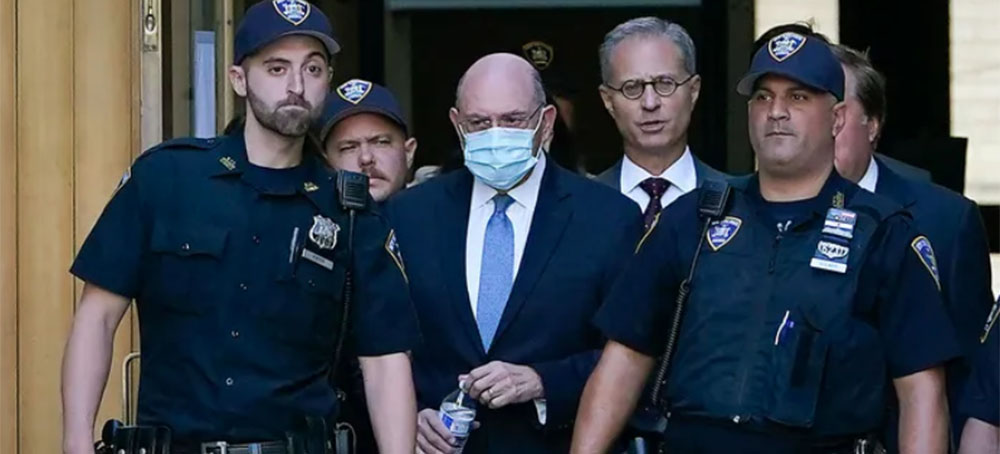 Just ask Trump Organization chief financial officer Allen Weisselberg. (photo: Timothy A. Clary/AFP)
Just ask Trump Organization chief financial officer Allen Weisselberg. (photo: Timothy A. Clary/AFP)
Don’t be distracted by lurid and dramatic details about hush-money deals and secret payoffs to a porn star and/or Playboy Playmate in the closing days of the 2016 presidential campaign: Trump’s alleged sleazy personal behavior (which he has strenuously denied) is almost certainly not the heart of the case. Falsifying business records, on the other hand, is a serious crime that, under New York law, can result in prison time. Trump, who is set to surrender in Manhattan on Tuesday, is expected to go through the same tedious, humiliating booking process as any other New York defendant — he’ll be read his rights, fingerprinted, photographed from the front and side for mug shots, and asked to enter a plea.
Trump and his followers continue to attempt to spin his looming indictment as the result of a politically motivated witch hunt based on a dubious legal theory. Senator Lindsey Graham called the case “legal voodoo” and “political persecution” on Fox News.
Bragg is expected to argue that hush-money payments to adult actress Stormy Daniels and/or ex–Playboy Playmate Karen McDougal were made by setting up a fake retainer agreement with Trump’s ex-lawyer, Michael Cohen, who paid the cash up front and later got reimbursed by Trump’s company for nonexistent legal services. Creating phony business transactions to hide the payments could constitute the misdemeanor offense of falsifying a business record, with the intention of committing or concealing a second crime of not reporting what was, in effect, a campaign contribution. (New York election law defines a contribution as “any thing of value, made in connection with the nomination for election, or election, of any candidate.”)
This is where things get sticky for Trump. Falsifying a business record in order to commit or conceal a second crime would bump the matter up from a misdemeanor to a felony, punishable by one to four years in prison. In fact, New York courts have found that the second crime need not even be proved: Mere intent to commit or conceal a crime can be sufficient to make records falsification a felony.
And don’t forget the devastating statements made by Trump’s own Department of Justice about the hush money in the sentencing memo prepared shortly before Cohen was sent to prison. “With respect to both payments, Cohen acted with the intent to influence the 2016 presidential election. Cohen coordinated his actions with one or more members of the campaign, including through meetings and phone calls, about the fact, nature, and timing of the payments,” the memo said. “In particular, and as Cohen himself has now admitted, with respect to both payments, he acted in coordination with and at the direction of Individual-1.”
Individual-1 is you-know-who.
So Trump is in serious legal jeopardy, not least because his adversary, Bragg, is a dogged and meticulous litigator who has proved he can build complex white-collar cases. Years ago, as an assistant U.S. Attorney under Preet Bharara, Bragg successfully prosecuted misconduct by elected officials, including former State Senator Malcolm Smith, who ended up in prison. Bragg also prosecuted a slew of white-collar criminals as the state’s chief deputy attorney general, and he prides himself on not bringing frivolous cases.
“I’ve done cases involving multimillion-dollar money laundering by business people who were financing violent criminal enterprises,” he said during a campaign debate in 2021. “The only misdemeanor case I’ve ever tried was two men blocking patients and staff going into Planned Parenthood. I’ve been very judicious with the use of prosecutorial power.”
During his time in the state AG’s office, one of the prosecutions Bragg worked on was the Trump University case, in which students complained they were defrauded out of thousands of dollars by a for-profit venture that was not an actual university. (Trump’s company ultimately closed its doors and settled the case by paying $25 million — about 90 percent of the tuition that had been received — without admitting wrongdoing.)
More recently, as district attorney, Bragg won a criminal conviction for tax fraud against the Trump Organization, resulting in the payment of a $1.6 million fine and the jailing of its CFO, Allen Weisselberg. It’s likely that Bragg’s office acquired enough records, documents, testimony, and insight about Trump’s business dealings to build out a new false-records case.
Commentators I know and respect, including Van Jones and Peggy Noonan, have lamented that the New York case is the wrong indictment at the wrong time.
“Charging [Trump] in the Stormy Daniels case is below us — not below him, but us. The subject matter is below us. The nature of the charges is below us,” Noonan wrote. “Are we doing the wise thing? No. Hold your fire. Save the mug shot for Georgia, the handcuffs for Jan. 6. Those were real offenses against the country. Not Stormy Daniels, which was an offense against his wife.”
“A charge like this — a porn-star payoff seven years ago, somehow tied to the election but not really — it doesn’t seem like the right way to go,” Jones said on CNN. “History is not going to judge Donald Trump based on Stormy Daniels. They’re going to judge him based on the election, going to judge him based on the coup attempt.”
I disagree. Putting aside the porn-star trivia, Trump’s shady business practices are highly relevant to his history, his character, and his campaign for reelection to the White House. In addition to heading companies found guilty of criminal tax fraud going back 15 years, Trump was ordered by a court to dissolve his family foundation, pay nearly $2 million, and acknowledge illegally using charitable funds for political purposes.
“Mr. Trump and the Foundation have admitted key facts about their illegal political coordination with the Trump campaign, including that a purported Foundation fundraiser in January 2016 was in fact a campaign event,” State Attorney General Letitia James noted in 2019. “That Foundation gave the Trump campaign complete control over the timing, amounts, and recipients of the $2.8 million raised through that event.”
Trump himself, along with his businesses and his three eldest children, are currently the subject of a massive civil lawsuit by James, who is alleging years of business fraud and seeking $250 million as well as a permanent ban on any of the named Trumps doing business in New York State.
Trump has lost or settled so many damaging lawsuits that it’s easy to forget that he used his businesses to cheat before and during the 2016 campaign. But that is why we have a judicial system that uses courts, prosecutors, juries, judges, and meticulous rules of evidence and procedure to discover truth and hold the powerful accountable.
Trump, an expert at distortion and distraction, is betting that the public will focus on threats, theatrics, public outrage, and personal insults rather than a formal investigation of his actions.
Don’t fall for it. Bet on Bragg.
READ MORE 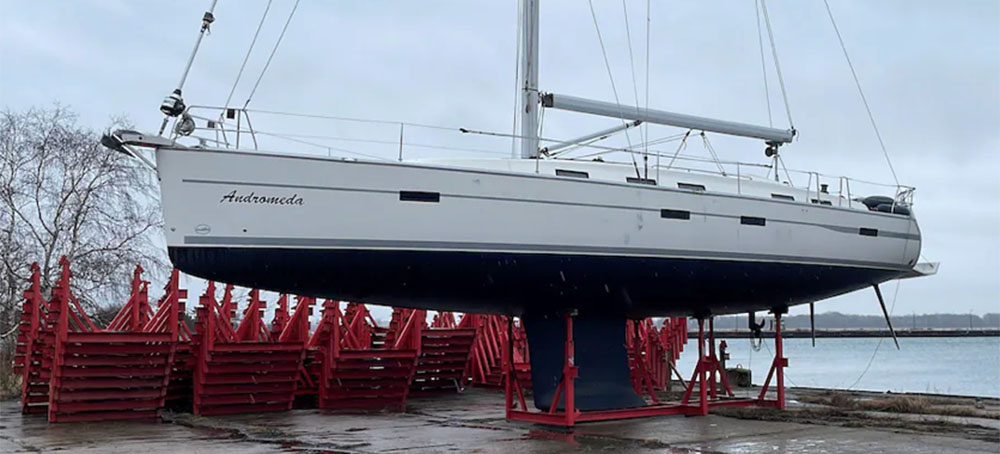 The 50-foot-long charter yacht Andromeda, which German prosecutors believe may be tied to the blasts of the Baltic Sea pipelines Nord Stream 1 and Nord Stream 2. (photo: Oliver Denzer/Reuters)
The 50-foot-long charter yacht Andromeda, which German prosecutors believe may be tied to the blasts of the Baltic Sea pipelines Nord Stream 1 and Nord Stream 2. (photo: Oliver Denzer/Reuters)
Officials believe more than one vessel might have been involved in sabotaging the natural gas pipeline last year and wonder if a 50-foot sailing yacht that investigators scoured for clues could be a decoy
But after months of investigation, law enforcement officials now suspect that the 50-foot yacht, the Andromeda, was probably not the only vessel used in the audacious attack. They also say the boat may have been a decoy, put to sea to distract from the true perpetrators, who remain at large, according to officials with knowledge of an investigation led by Germany’s attorney general. They spoke on the condition of anonymity to share details about the active inquiry, including doubts about the Andromeda’s role that haven’t been previously reported.
Officials hope that the true purpose of Andromeda in the deep-sea demolition will provide further insight in a high-stakes, international whodunnit that could eventually lead to those responsible and explain their motives, which remain unclear.
U.S. and European officials said they still don’t know for sure who is behind the underwater attack. But several said they shared German skepticism that a crew of six people on one sailboat laid the hundreds of pounds of explosives that disabled Nord Stream 1 and part of Nord Stream 2, a newer set of pipelines that wasn’t yet delivering gas to customers.
Experts noted that while it was theoretically possible to place the explosives on the pipeline by hand, even skilled divers would be challenged submerging more than 200 feet to the seabed and slowly rising to the surface to allow time for their bodies to decompress.
Such an operation would have taken multiple dives, exposing the Andromeda to detection from nearby ships. The mission would have been easier to hide and pull off using remotely piloted underwater vehicles or small submarines, said diving and salvage experts who have worked in the area of the explosion, which features rough seas and heavy shipping traffic.
The German investigation has determined that traces of “military-grade” explosives found on a table inside the boat’s cabin match the batch of explosives used on the pipeline. Several officials doubted that skilled saboteurs would leave such glaring evidence of their guilt behind. They wonder if the explosive traces — collected months after the rented boat was returned to its owners — were meant to falsely lead investigators to the Andromeda as the vessel used in the attack.
“The question is whether the story with the sailboat is something to distract or only part of the picture,” said one person with knowledge of the investigation.
Still others allow that the bombers may simply have been sloppy.
“It doesn’t all fit,” a senior European security official said of the fragments of evidence. “But people can make mistakes.”
Suspicions turn to Poland and Ukraine
The German investigation has linked the yacht rental to a Polish company, which is in turn owned by a European company that’s connected to a prominent Ukrainian, fueling speculation from Berlin to Warsaw to Kyiv that a deep-pocketed partisan may have financed the operation. The identity of the Polish company and the Ukrainian individual, as well as his potential motive, remains unclear.
Based on the initial German findings, officials have been whispering about the potential involvement of the Polish or Ukrainian government in the attack. Poland arguably had a motive, some said, considering it has been among the most vocal critics of the Nord Stream project since it began in the late 1990s, warning that the pipelines, running from western Russia to Germany, would make Europe dependent on the Kremlin for energy.
Marcin Przydacz, the Polish president’s chief foreign policy adviser, urged caution about reaching conclusions from the initial evidence. He too shared the view that the Andromeda could be a red herring, but said it may have been planted by Moscow.
“This could be a Russian game to blame” Poland, Przydacz said in an interview at the presidential palace in Warsaw. “Poland had nothing to do with this [attack].”
Intelligence agencies have found no clear evidence that Russia, initially the prime suspect, was responsible.
Privately, former Polish government officials said that despite the country’s vehement opposition to Nord Stream and staunch support for arming Ukraine, they doubted that President Andrzej Duda would authorize an act that risked fracturing the alliance of nations that have come to Ukraine’s defense. Polish officials routinely refer to Ukraine’s conflict with Russia as “our war” and are fearful that if Russian President Vladimir Putin succeeds there, he would set his sights on Poland next.
Suspicion also has turned toward Ukraine as the culprit behind the Nord Stream bombings, based in part on intercepted communications of pro-Ukraine individuals discussing the possibility of carrying out an attack on the pipelines before the explosions, The Washington Post previously reported.
A senior Western security official with knowledge of the secretly gathered intelligence said the communications were only discovered after the bombing, when Western spy agencies began searching their records for insights.
“Ukraine absolutely did not participate in the attack on Nord Stream,” Mykhailo Podolyak, a top adviser to President Volodymyr Zelensky, said last month, questioning why his country would conduct an operation that “destabilizes the region and will divert attention from the war, which is categorically not beneficial to us.”
Those who suspect Ukrainian involvement said that disabling the pipeline could have been an effort to galvanize allied support in the face of Russian aggression, and particularly to strengthen German resolve. Germany had halted activated authorization for the Nord Stream 2 pipeline days before Russia invaded Ukraine.
Officials in the United States and Europe initially blamed Russia for the bombing. The country had already halted gas flows on Nord Stream 1, the older of the two sets of pipelines. That suggested that Moscow was willing to engage in a form of political blackmail with energy supplies.
One of the pair of Nord Stream 2 pipes remains intact. Both of the Nord Stream 1 lines were severed in the explosions on Sept. 26.
Some officials said that Ukrainian saboteurs or those from other countries acting in what they felt were Ukraine’s best interest could have attacked Nord Stream without Zelensky’s knowledge, arguing that he doesn’t have complete visibility into all the operations of his government or the military. That kind of plausible deniability could protect the celebrated leader and dampen the political fallout of a brazen attack tied to his country, these officials said.
No country has provided firm evidence tying the attacks to Ukraine, and a senior Biden administration official has cautioned that the intercepted communications of pro-Ukrainian actors are not conclusive.
German Defense Minister Boris Pistorius warned against making early conclusions as to who was responsible, suggesting that it might be a “false flag” operation, an idea echoed by other German politicians.
Roderich Kiesewetter, a German lawmaker who is part of a committee that was briefed last month by intelligence officials on the probe’s progress, said he believes that investigators have not yet communicated any results because the “evidence is far too thin.”
Kiesewetter said that unfounded speculation over the culprits could endanger cohesion in Europe. “We should continue to ask who had an interest in the detonation” and who “benefits from uncertainty and accusations,” he said.
Trail of breadcrumbs
As the Nord Stream mystery has turned into an international game of Clue, German investigators have scoured the Andromeda for leads. Officials first became interested in the vessel after the country’s domestic intelligence agency received a “very concrete tip” from a Western intelligence service that the boat may have been involved in the sabotage, according to a German security official, who declined to name the country that shared the information.
German authorities determined that the tip was credible and passed the information onto law enforcement officials, the official said.
The Andromeda left a virtual trail of breadcrumbs as it set off from a German port for the Baltic Sea, according to investigators.
Mola Yachting rented out the boat on Sept. 6 from Hohe Düne harbor in Warnemünde, a German port town on the Baltic, near Rostock, which is about 145 miles north of Berlin. The rental location is in plain sight of a huge vacation complex, home to a five-star hotel, seven restaurants and a high-end shopping area, with views across the harbor.
Investigators said the boat then traveled in a northeasterly direction, stopping in Hafendorf Wiek, or “Wiek harbor village,” on the northernmost part of Rügen island.
When a reporter from The Post visited in early March, the area had emptied out, save for the odd local dog-walker braving the biting temperatures. A half-dozen yachts bobbed in the water where the Andromeda is said to have been. “Investigators came [in] mid-January, and we helped them where we could,” said the harbor master, René Redmann.
“It wouldn’t be unusual for a boat setting off from Rostock with the destination of Bornholm to stop in Wiek,” Redmann noted, referring to a Danish island near the site of the Nord Stream explosion. Investigators believe that the Andromeda left Hafendorf Wiek and moored off the coast of the tiny island Christianso, near Bornholm.
A stop in Hafendork Wiek may have offered the Andromeda’s crew a final chance to stock up on supplies before heading to the explosion site.
“Lots of things are loaded on the boats … including groceries,” Redmann said. “Some people stop to tank up on fuel.” Redmann would not confirm that the Andromeda stopped there, citing the continuing law enforcement investigation. But he said he wouldn’t have any record of the crew’s identities, just the name of the boat, the number of people aboard and the type of vessel.
“Recording names of passengers is the job of the charter,” Redmann said.
Thomas Richter, co-owner of the charter company Mola, said that the search of the Andromeda took place in Dranske, on Rügen island, where the yacht was kept in winter storage. He declined to share further details.
‘Don’t talk about Nord Stream’
For all the intrigue around who bombed the pipeline, some Western officials are not so eager to find out.
At gatherings of European and NATO policymakers, officials have settled into a rhythm, said one senior European diplomat: “Don’t talk about Nord Stream.” Leaders see little benefit from digging too deeply and finding an uncomfortable answer, the diplomat said, echoing sentiments of several peers in other countries who said they would rather not have to deal with the possibility that Ukraine or allies were involved.
Even if there were a clear culprit, it would not likely stop the provision of arms to Ukraine, diminish the level of anger with Russia or alter the strategy of the war, these officials argued. The attack happened months ago and allies have continued to commit more and heavier weapons to the fight, which faces a pivotal period in the next few months.
Since no country is yet ruled out from having carried out the attack, officials said they were loath to share suspicions that could accidentally anger a friendly government that might have had a hand in bombing Nord Stream.
In the absence of concrete clues, an awkward silence has prevailed.
“It’s like a corpse at a family gathering,” the European diplomat said, reaching for a grim analogy. Everyone can see there’s a body lying there, but pretends things are normal. “It’s better not to know.”
READ MORE 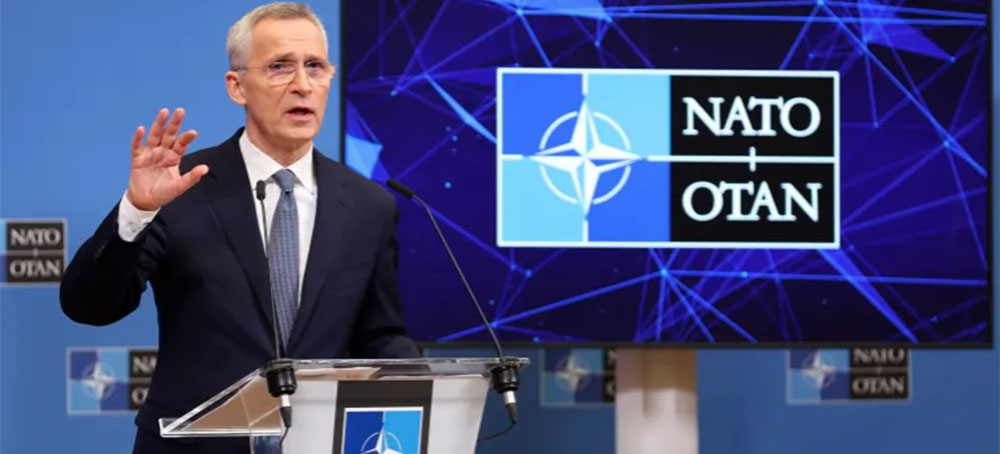 NATO Secretary General Jens Stoltenberg says he hopes Sweden will be able to join NATO in time for a July summit. (photo: Geert Vanden Wijngaert/AP)
NATO Secretary General Jens Stoltenberg says he hopes Sweden will be able to join NATO in time for a July summit. (photo: Geert Vanden Wijngaert/AP)
Finland to become 31st member of world’s biggest military alliance, prompting a warning from Russia.
“This is a historic week,” Stoltenberg told reporters on Monday on the eve of a meeting of NATO foreign ministers in Brussels. “From tomorrow, Finland will be a full member of the alliance.”
He said he hopes Sweden, who applied for membership at the same time as Finland, will also be able to join NATO in the coming months.
The former Norwegian prime minister said on Tuesday “we will raise the Finnish flag for the first time here at the NATO headquarters. It will be a good day for Finland’s security, for Nordic security and for NATO as a whole”.
Stoltenberg said Turkey, the last NATO country to have ratified Finland’s membership, will hand its official texts to US Secretary of State Antony Blinken on Tuesday. Stoltenberg said he would then invite Finland to do the same.
Finnish President Sauli Niinistö and Defence Minister Antti Kaikkonen will attend the ceremony along with Foreign Minister Pekka Haavisto.
“It is a historic moment for us,” Haavisto said in a statement. “For Finland, the most important objective at the meeting will be to emphasise NATO’s support to Ukraine as Russia continues its illegal aggression. We seek to promote stability and security throughout the Euro-Atlantic region.”
Russian Deputy Foreign Minister Alexander Grushko said Moscow would respond to Finland becoming a NATO member by bolstering its defences.
“We will strengthen our military potential in the west and in the northwest,” Grushko said in remarks carried by the state RIA Novosti news agency. “In case of deployment of forces of other NATO members on the territory of Finland, we will take addition steps to ensure Russia’s military security.”
The announcement of Finland’s entry came just after Finnish voters gave a boost to conservative parties in weekend elections, depriving left-wing Prime Minister Sanna Marin of another term. Marin had championed her country’s NATO accession.
The Nordic neighbours Finland and Sweden abandoned their traditional positions of military non-alignment to seek protection under NATO’s security umbrella after Russia invaded Ukraine a little more than a year ago.
All 30 existing members signed Finland’s and Sweden’s accession protocols. Turkey and Hungary then delayed the process for months but have relented on Finland. Turkey has sought guarantees and assurances from the two countries, notably on tackling groups it considers “terrorist” organisations. Hungary’s demands have never been explicit.
NATO must agree unanimously for new members to join. NATO officials are eager to bring Sweden within the fold before a NATO summit in the Lithuanian capital, Vilnius, on July 11-12.
“Sweden is not left alone. Sweden is as close as it can come as a full-fledged member,” Stoltenberg said.
READ MORE  Lexi Rizzo. (photo: GoFundMe)
Lexi Rizzo. (photo: GoFundMe)
Howard Schultz told lawmakers Starbucks was not a “union-busting” company. Two days later, they fired Lexi Rizzo, allegedly for being late.
Lexi Rizzo led the campaign at a Starbucks in Buffalo that was one of the first to hold a successful unionization vote, launching a movement that has spread across the country and involved thousands of Starbucks workers.
Rizzo—who had worked for the company for seven years, according to a GoFundMe—was fired from her job as a shift supervisor on Friday, according to the Buffalo News.
Rizzo was canned for repeatedly being late to work, Starbucks told the outlet. The union, Starbucks Workers United, said Rizzo’s firing is “retaliation at its worst.” Two other pro-union workers were also fired, the union said.
“I have given every ounce of everything that I have to this company,” Rizzo said in an emotional video posted to TikTok, “My heart is broken.”
Rizzo went on to take aim at Schultz, who appeared before the Senate's Health, Education, Labor and Pensions (HELP) last Wednesday.
“You are a heartless monster and I don’t know how you sleep at night,” she said of Schultz, “You have hundreds of thousands of people giving everything that they have so that you can make another dollar. And then you treat us like we’re dirt.”
Democratic Senators confronted Schultz last week on eight rulings by administrative judges at the National Labor Relations Board (NLRB) that Starbucks had committed 130 labor law violations since the union campaign began in Buffalo in December 2021. Schultz denied that the company had violated the law.
Last month, a NLRB administrative judge found that Starbucks had committed “egregious and widespread" violations of labor law when it fired six pro-union workers in Buffalo and Rochester. The company was ordered to rehire and compensate the workers.
“Starbucks has waged the most aggressive and illegal union-busting campaign in the modern history of our country,” Sen. Bernie Sanders (I-VT) said as he opened the hearing. “That union-busting campaign has been led by Howard Schultz.”
READ MORE  Owen Diaz accused Tesla of failing to act against racist slurs and scrawled swastikas, racist caricatures and epithets on walls and work areas. (photo: Josh Edelson/AFP)
Owen Diaz accused Tesla of failing to act against racist slurs and scrawled swastikas, racist caricatures and epithets on walls and work areas. (photo: Josh Edelson/AFP)
Originally awarded $130m, which a judge reduced to $15m, plaintiff opted for new trial against the electric vehicle maker
The amount is far less than the $15m that the plaintiff, Owen Diaz, rejected last year in opting for a new trial. Diaz asked for a new trial on damages after the judge reduced the amount he was awarded in a 2021 ruling from $137m to $15m. Diaz accused Tesla of failing to act when he repeatedly complained to managers that employees at the Fremont factory frequently used racist slurs and scrawled swastikas, racist caricatures and epithets on walls and work areas.
The jury on Monday awarded him $175,000 in damages for emotional distress and $3m in punitive damages designed to punish unlawful conduct and deter it in the future.
Bernard Alexander, a lawyer for Diaz, urged jurors during closing statements on Friday to award him nearly $160m in damages, and send a message to Tesla and other large companies that they will be held accountable for failing to address discrimination.
“Mr Diaz’s outlook on the world has been permanently changed,” Alexander said. “That is what happens when you take away a person’s safety.”
Tesla’s lawyer, Alex Spiro, countered that Diaz was a confrontational worker who had exaggerated his claims of emotional distress, and said his lawyers failed to show any serious, long-lasting damage caused by Tesla.
Diaz testified last week, tearfully recounting various incidents during the nine months that he worked at the Fremont factory. Diaz said the job made him anxious and strained his relationship with his son, who also worked at the plant.
Lawyers for Tesla highlighted what they said were inconsistencies in Diaz’s testimony and repeatedly raised the fact that he did not lodge written complaints to supervisors. Diaz testified that he verbally complained to managers numerous times and discussed his complaints with Tesla human resources officials.
The carmaker is facing similar claims of tolerating race discrimination at the Fremont plant and other workplaces in a pending class action by Black workers, a separate case from a California civil rights agency and multiple cases involving individual workers. The company has denied wrongdoing in those cases.
Diaz had sued Tesla for violating a California law that prohibits employers from failing to address hostile work environments based on race or other protected traits.
The first jury in 2021 awarded Diaz $7m in damages for emotional distress and a staggering $130m in punitive damages. The award was one of the largest in an employment discrimination case in US history.
A US district judge last year agreed with the jury that Tesla had broken the law, but said the award was excessive because Diaz had worked at the factory for only nine months and had not alleged any physical injury or illness, and cut it to $15m.
READ MORE 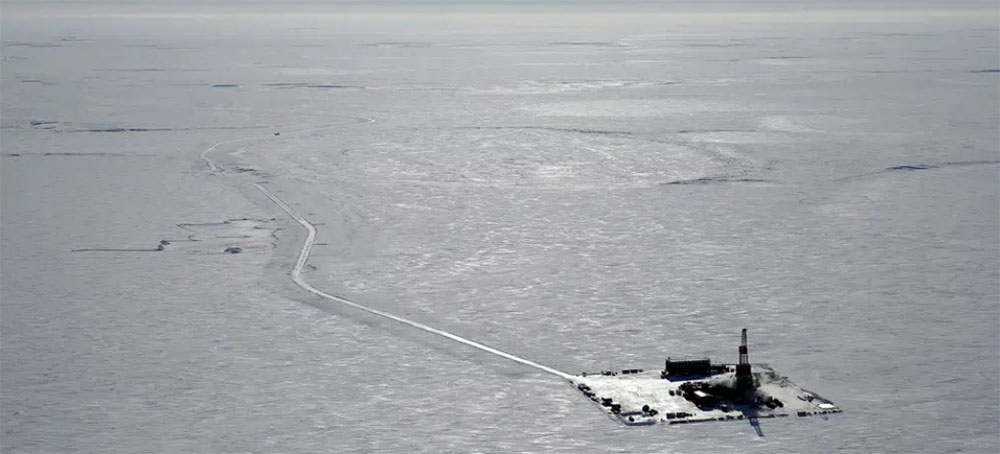 This 2019 aerial photo provided by ConocoPhillips shows an exploratory drilling camp at the proposed site of the Willow oil project on Alaska's North Slope. (photo: ConocoPhillips/Alaska Public Media)
This 2019 aerial photo provided by ConocoPhillips shows an exploratory drilling camp at the proposed site of the Willow oil project on Alaska's North Slope. (photo: ConocoPhillips/Alaska Public Media)
U.S. District Court Judge Sharon Gleason denied requests for an injunction that would have stopped the company from working in the final weeks of the winter construction season, which will likely end in late April, when the tundra becomes too soft for heavy equipment to travel on.
Environmental groups and local residents who oppose the project filed two lawsuits last month, claiming the decision to allow ConocoPhillips to develop its leases in the National Petroleum Reserve was made contrary to environmental laws.
Those cases are still pending. But the judge declined to stop work on Willow in the meantime, saying the plaintiffs did not convince her that the company’s winter construction plans would cause serious and irreparable harm.
Her decision frees ConocoPhillips to embark on its plan to build ice and gravel roads, open a gravel mining site and begin hauling and dumping gravel in the National Petroleum Reserve-Alaska. Noise and vibration from blasting at the mine site won’t cause permanent harm, the judge wrote.
She acknowledged that the mayor and some residents of Nuiqsut — the closest village — have concerns about Willow, but Gleason said she gave “considerable weight” to the views of the North Slope Borough, the regional Native corporation and the village corporation for Nuiqsut, all of whom support the project and the winter construction activities.
The Wilderness Society, one of the groups that is suing, issued a statement vowing to continue to fight the project.
Follow us on facebook and twitter!
PO Box 2043 / Citrus Heights, CA 95611

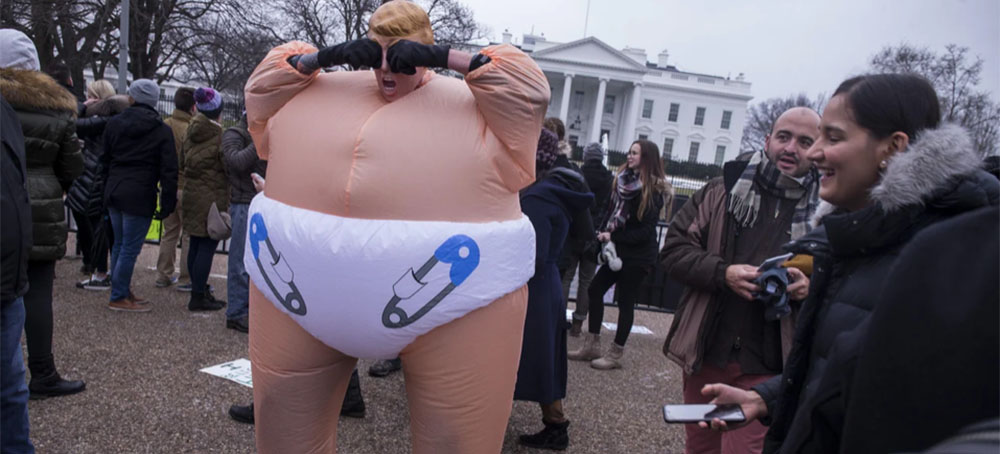

No comments:
Post a Comment
Note: Only a member of this blog may post a comment.